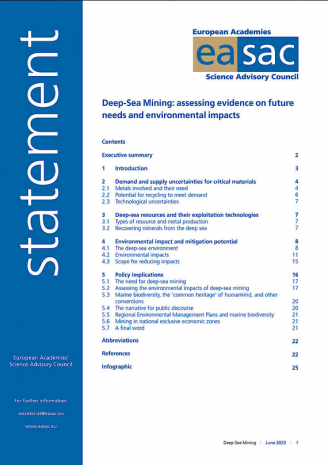The European Academies' Science Advisory Council (EASAC) released on 8 June a statement addressing the critical issue of deep-sea mining, which holds significant relevance in the current global context. An international negotiation involving countries from around the world is taking place at the end of June 2023. At the heart of this international negotiation lies the International Seabed Authority (ISA), which has attracted considerable attention due to its anticipated approval of full-scale mining operations at the seabed. However, the EASAC statement highlights concerns regarding the ISA's ability to adequately assess and control the environmental impact of such activities.
The International Seabed Authority (ISA) organises and controls activities related to mineral resources in ‘the Area’ (defined as the seabed, ocean floor, and subsoil beyond the limits of national jurisdiction). The ISA has awarded exploration contracts for minerals in the Area since 2001 and is now developing a mining code for exploitation. While the ISA has the mandate to ensure the effective protection of the marine environment from harmful effects that may arise from mining activities, there is debate about the level of harm that might be caused by mining and whether the draft regulations are robust enough to meet that mandate and provide effective control.
Policy-makers must thus assess whether economic pressures to extract minerals from the deep sea are compatible with the protection of marine ecosystems and their biodiversity. To inform current debate in the European Union and more broadly, the European Academies’ Science Advisory Council (EASAC) has assessed the implications of the latest science and issued this Statement.
This statement was originally published on the EASAC website. You can read it here, together with the EASAC presse release.

